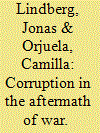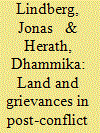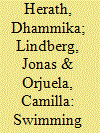|
|
|
Sort Order |
|
|
|
Items / Page
|
|
|
|
|
|
|
| Srl | Item |
| 1 |
ID:
133423


|
|
|
|
|
| Summary/Abstract |
'Corruption in the aftermath of war' brings together an interdisciplinary group of scholars to enquire into the dynamics of corruption in post-conflict societies. This introduction discusses five themes, problematising and summarising key findings from the 10 articles included. First, we discuss the problems with the corruption concept, related to its moralising connotations and definitional vagueness, and propose viewing corruption as a collective action dilemma as a way of avoiding these moralising aspects. Second, we discuss post-conflict societies, and highlight the great varieties of 'peace' that that label can refer to. We suggest that the causes, dynamics and effects of corruption in post-conflict societies bear many similarities with those in other societies, but that the post-conflict situation often generates an intensification and entrenchment of corruption-related problems. Third, we analyse the dynamics between international interveners and domestic actors, and show the contradictions and tensions in international-domestic relations. Fourth, we argue that the inter-linkages between inequality, mistrust and corruption deserve consideration in the study of post-conflict societies, and that inequality in particular merits more attention. Finally, we discuss some methodological challenges encountered by the contributors in their studies of corruption in post-conflict societies.
|
|
|
|
|
|
|
|
|
|
|
|
|
|
|
|
| 2 |
ID:
134285


|
|
|
|
|
| Summary/Abstract |
Corruption in the aftermath of war’ brings together an interdisciplinary group of scholars to enquire into the dynamics of corruption in post-conflict societies. This introduction discusses five themes, problematising and summarising key findings from the 10 articles included. First, we discuss the problems with the corruption concept, related to its moralising connotations and definitional vagueness, and propose viewing corruption as a collective action dilemma as a way of avoiding these moralising aspects. Second, we discuss post-conflict societies, and highlight the great varieties of ‘peace’ that that label can refer to. We suggest that the causes, dynamics and effects of corruption in post-conflict societies bear many similarities with those in other societies, but that the post-conflict situation often generates an intensification and entrenchment of corruption-related problems. Third, we analyse the dynamics between international interveners and domestic actors, and show the contradictions and tensions in international–domestic relations. Fourth, we argue that the inter-linkages between inequality, mistrust and corruption deserve consideration in the study of post-conflict societies, and that inequality in particular merits more attention. Finally, we discuss some methodological challenges encountered by the contributors in their studies of corruption in post-conflict societies.
|
|
|
|
|
|
|
|
|
|
|
|
|
|
|
|
| 3 |
ID:
113355


|
|
|
|
|
| Publication |
2012.
|
| Summary/Abstract |
In the context of knowledge-intensive globalisation and severe poverty, policy makers in the South face various educational planning dilemmas. These are ultimately political, implying that there are no ways of avoiding tensions and trade-offs when attempting to handle them. Such dilemmas have been subject to debate in the research community and have been framed differently in different historical contexts. The contemporary development policy discourse, however, largely conceals the existence of dilemmas by suggesting that we have reached a global consensus regarding the role of education in development. This article illustrates that this consensus is imaginary and consequently aims to reframe educational planning dilemmas in the contemporary policy context. It is shown that the dilemmas have changed character and now largely revolve around how to navigate and negotiate in highly complex political landscapes. Future research should focus on such ongoing wars of position and expose the many tensions concealed by the hegemonic policy discourse.
|
|
|
|
|
|
|
|
|
|
|
|
|
|
|
|
| 4 |
ID:
134296


|
|
|
|
|
| Summary/Abstract |
There is a growing academic literature on both land and corruption in relation to post-conflict peace building. This paper aims to understand what role corruption complaints play in the nexus between land and grievances in post-conflict societies. Drawing on field material collected in Sri Lanka, the paper interrogates the role of corruption complaints in relation to a number of highly politicised and ethnicised post-conflict land issues, ranging from the return of idps and alleged new resettlement schemes to land grabbing for military, ‘development’ and/or commercial purposes. The comparatively high visibility of land use, and the fact that land-related corruption is likely to affect a specific set of people who lay claim to the land, makes it a particularly important area to address in research on corruption and post-conflict peace building.
|
|
|
|
|
|
|
|
|
|
|
|
|
|
|
|
| 5 |
ID:
167248


|
|
|
|
|
| Summary/Abstract |
Corruption is endemic, pervasive and embedded in the very fabric in social life in some societies, although its degree varies case to case. Previous academic research and anti-corruption watchdogs have examined corruption in Sri Lanka, where corruption is perceived to be pervasive and endemic but, existing studies are inadequate to explain why corruption occurs and anti-corruption continues to fail in Sri Lanka. In our study, we use the contrasting perspectives of ‘collective action problem’ and the ‘principal-agent’ framework to analyse the dynamics that cause and maintain corruption in Sri Lanka as well as the obstacles and possibilities that people fighting corruption are experiencing. We address this aim in a novel way: our observations and fieldwork in Sri Lanka got us in contact with individuals who made concerted efforts to reveal and oppose corruption at different levels; we call them ‘corruption fighters’. We argue, through the insights from corruption fighters, that corruption represents a ‘collective action problem’ and that to understand why corruption fighters still choose to oppose it, they need to be situated within a discourse of corruption and close attention must be paid to personal motivations and the way they construct meaning in the fight against corruption.
|
|
|
|
|
|
|
|
|
|
|
|
|
|
|
|
|
|
|
|
|